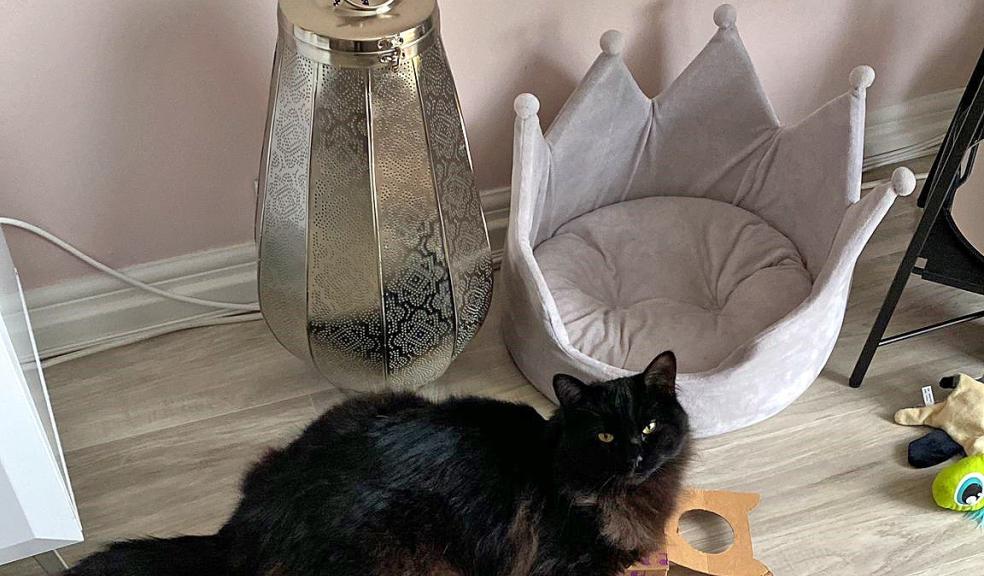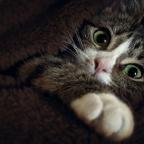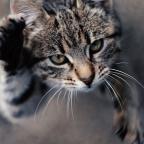
Stressed out moggy becomes a contented kitty thanks to expert intervention
A two-year-old cat has found a new home after being given up due to his tendency to lash out when stressed.
When Star came into Cats Protection's Forth Valley Adoption Centre in August 2022, it was identified that he was displaying misdirected predatory aggression, which meant that he would attack his carers' legs when they walked past or moved too quickly.
While he was in care the centre worked closely with the charity's Behaviour team, whose work is kindly supported by players of People's Postcode Lottery, to understand and address Star's aggressive type behaviours.
Laura Chow, Head of Charities at People's Postcode Lottery, said: "Cats bring so much joy into people's lives and funds raised by players of People's Postcode Lottery help in their safeguarding and welfare. It is brilliant to hear that Star's behavioural issues have been overcome and he is now enjoying his new forever home."
Cats Protection's Behaviour Officer Sammie Ravenscroft said: "Star had a lot of energy and would often show aggression when members of the team had to block him from escaping when they were entering or leaving his pen.
"Having ruled out any medical reasons for his behaviour, the centre team had already spread his food over more daily feeds, increased his enrichment and play, and placed him in a pen that he could see outside from.
"There was a two-fold strategy with Star. We needed to work on reducing the underlying cause for the behaviour whilst also implementing some behaviour management techniques initially to reduce the chance of injury to staff. For example, as he was food motivated, I suggested that his carers have a treat or toy ready to throw to the back of his pen and as they were entering or leaving, to distract him and reduce the risk of him trying to escape and attacking their feet.
"I also suggested that they wear protective shoes and thick trousers so that they didn't react to his biting when it did happen, as this can reinforce the unwanted behaviour."
Star's behaviour began to improve with these interventions, and he was soon adopted by local cat lover Tracey.
Before he went home, Sammie created a condensed behaviour plan for his new owners so that they could implement things straight away. The plan mostly focused on increased enrichment and appropriate play to help expel some of his excess energy.
His new owner, Tracey, said: "Star has come on leaps and bounds since he's been with us. When he first came home, we did have some challenging behaviours from him and he seemed a bit stressed.
"Happily, Sammie gave us lots of advice, including using puzzle feeding to help keep him entertained and how to approach play and handling to avoid overstimulation. We also looked at ways to reduce any stressors that could have been exacerbating his behaviour.
"We really noticed a difference in just a few weeks, in particular with his toys - we got him a kicker toy and a cardboard scratch pad and gave them to him before his dinner. He loved both and got a few fierce kicks and scratches out on them. We then gave him his dinner straight after he had calmed down and since then have followed this routine. We also started to reduce how much of a fuss we gave him, which was difficult but definitely helped.
"He's an absolute darling - most of the time! - and even lets us dry him with a towel when he comes in wet from the rain, without any biting or scratching, so it seems we are gaining his trust more and more each day. Any time we see the odd swipe from him we're continuing to ignore it and walk away from him and, thankfully, we are seeing this less and less as time goes on.
"He now spends most nights cuddled up beside us in bed and regularly flops at our feet for a fuss. He's the loveliest wee boy who seems to enjoy being around us just as much as we enjoy having him."
Cats Protection's CATS (Cats and their Stats) Report 2022 found that nearly three quarters of cats (72%) exhibit at least one stress-associated behaviour. For advice on cat behaviour, visit www.cats.org.uk/behaviour







